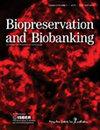Quality Assessment of Long-Term Cryopreserved Human Bone-Derived Marrow Mesenchymal Stromal Cell Samples: Experience from the Texas Heart Institute Biorepository and Biospecimen Profiling Core.
IF 1.4
4区 生物学
Q4 CELL BIOLOGY
引用次数: 0
Abstract
In biomedical research, biorepositories are pivotal resources that safeguard and supply clinical samples for scientific investigators. Proper long-term cryopreservation conditions are essential to maintain biospecimen quality. In this study, we analyzed the efficacy of sample cryopreservation at the Texas Heart Institute Biorepository and Biospecimen Profiling Core (THI-BRC). Our assessments included a thorough review of internal processes, quality reports, and both internal and external audit outcomes. We examined the integrity of human bone marrow-derived multipotent mesenchymal stromal cells (BM-MSCs) that were cryopreserved for over 5 years. These samples originated from randomly selected clinical trial participants or commercially sourced cell lines. Parameters such as cell viability, DNA and RNA integrity, population doubling time, sterility, and BM-MSC-specific attributes such as surface antigen expression and differentiation potential were studied. BM-MSC samples cryopreserved for ∼6 months served as our control. Our results demonstrated that the 5-year cryopreserved samples maintained their integrity compared with the shorter-term stored control samples. Moreover, THI-BRC has met accreditation agency standards and has not received any repeated deficiencies over 7 years. Collectively, our findings affirm that THI-BRC's biospecimen storage protocols align with accepted standards as confirmed by the quality assessment of long-term stored clinical samples.长期冷冻保存的人类骨衍生骨髓间充质基质细胞样本的质量评估:德克萨斯心脏研究所生物储存库和生物样本分析核心的经验。
在生物医学研究中,生物储存库是为科学研究人员保护和提供临床样本的关键资源。适当的长期冷冻保存条件对保持生物样本的质量至关重要。在本研究中,我们分析了德克萨斯心脏研究所生物储存库和生物样本分析核心(THI-BRC)样本冷冻保存的功效。我们的评估包括对内部流程、质量报告以及内部和外部审计结果的全面审查。我们检查了冷冻保存超过 5 年的人类骨髓多能间充质基质细胞 (BM-MSCs) 的完整性。这些样本来自随机抽取的临床试验参与者或商业来源的细胞系。研究了细胞存活率、DNA 和 RNA 完整性、群体倍增时间、无菌性以及 BM-MSC 特异性属性(如表面抗原表达和分化潜能)等参数。冷冻保存 6 个月的 BM-MSC 样本作为对照。结果表明,与保存时间较短的对照样本相比,冷冻保存 5 年的样本仍能保持其完整性。此外,太和生物中心符合认证机构的标准,7 年来没有重复出现任何缺陷。总之,我们的研究结果证实,太和生物技术中心的生物样本储存协议符合公认的标准,长期储存的临床样本的质量评估也证实了这一点。
本文章由计算机程序翻译,如有差异,请以英文原文为准。
求助全文
约1分钟内获得全文
求助全文
来源期刊

Biopreservation and Biobanking
CELL BIOLOGY-MEDICAL LABORATORY TECHNOLOGY
CiteScore
3.30
自引率
12.50%
发文量
114
审稿时长
6-12 weeks
期刊介绍:
Biopreservation and Biobanking is the first journal to provide a unifying forum for the peer-reviewed communication of recent advances in the emerging and evolving field of biospecimen procurement, processing, preservation and banking, distribution, and use. The Journal publishes a range of original articles focusing on current challenges and problems in biopreservation, and advances in methods to address these issues related to the processing of macromolecules, cells, and tissues for research.
In a new section dedicated to Emerging Markets and Technologies, the Journal highlights the emergence of new markets and technologies that are either adopting or disrupting the biobank framework as they imprint on society. The solutions presented here are anticipated to help drive innovation within the biobank community.
Biopreservation and Biobanking also explores the ethical, legal, and societal considerations surrounding biobanking and biorepository operation. Ideas and practical solutions relevant to improved quality, efficiency, and sustainability of repositories, and relating to their management, operation and oversight are discussed as well.
 求助内容:
求助内容: 应助结果提醒方式:
应助结果提醒方式:


